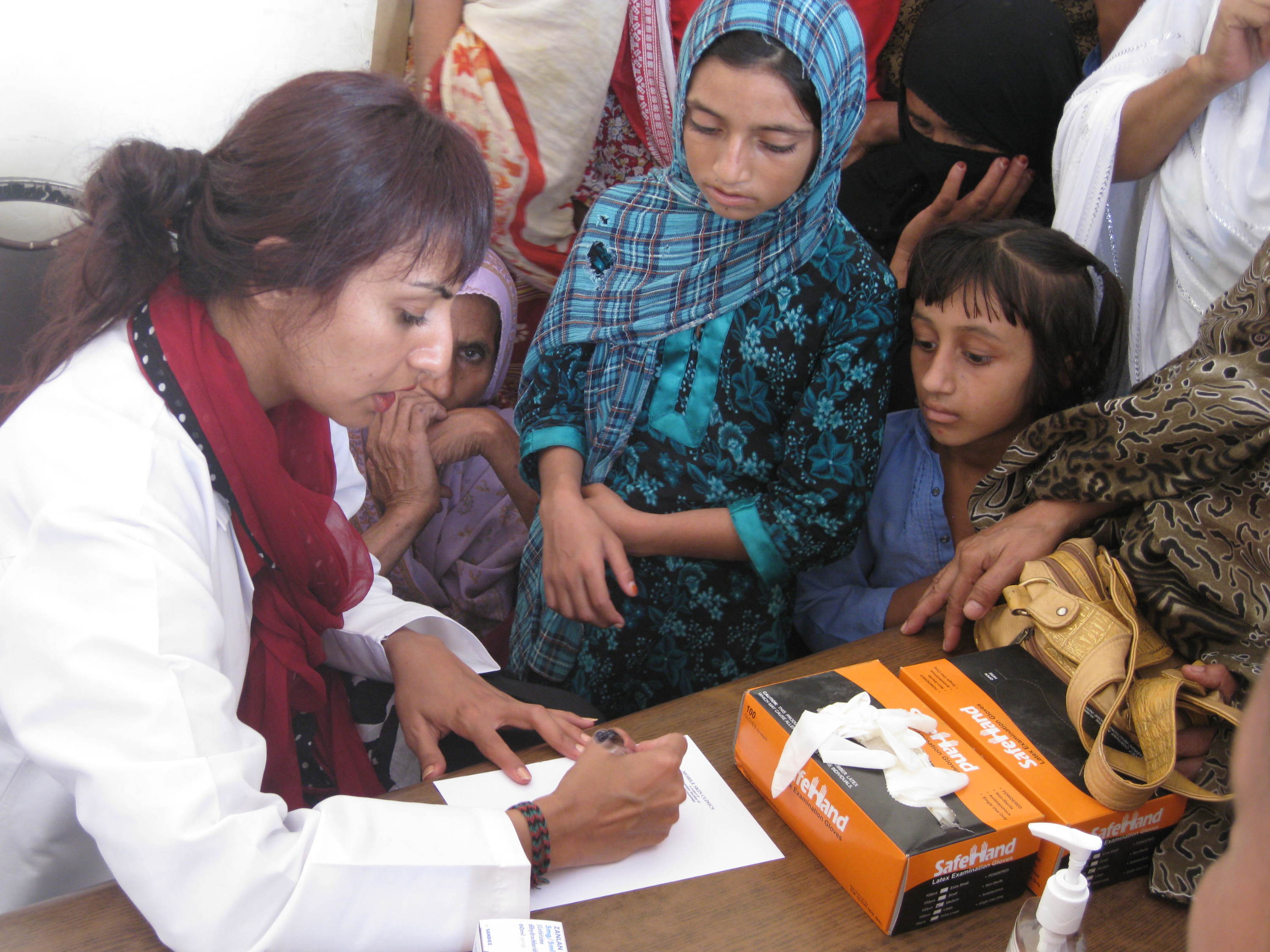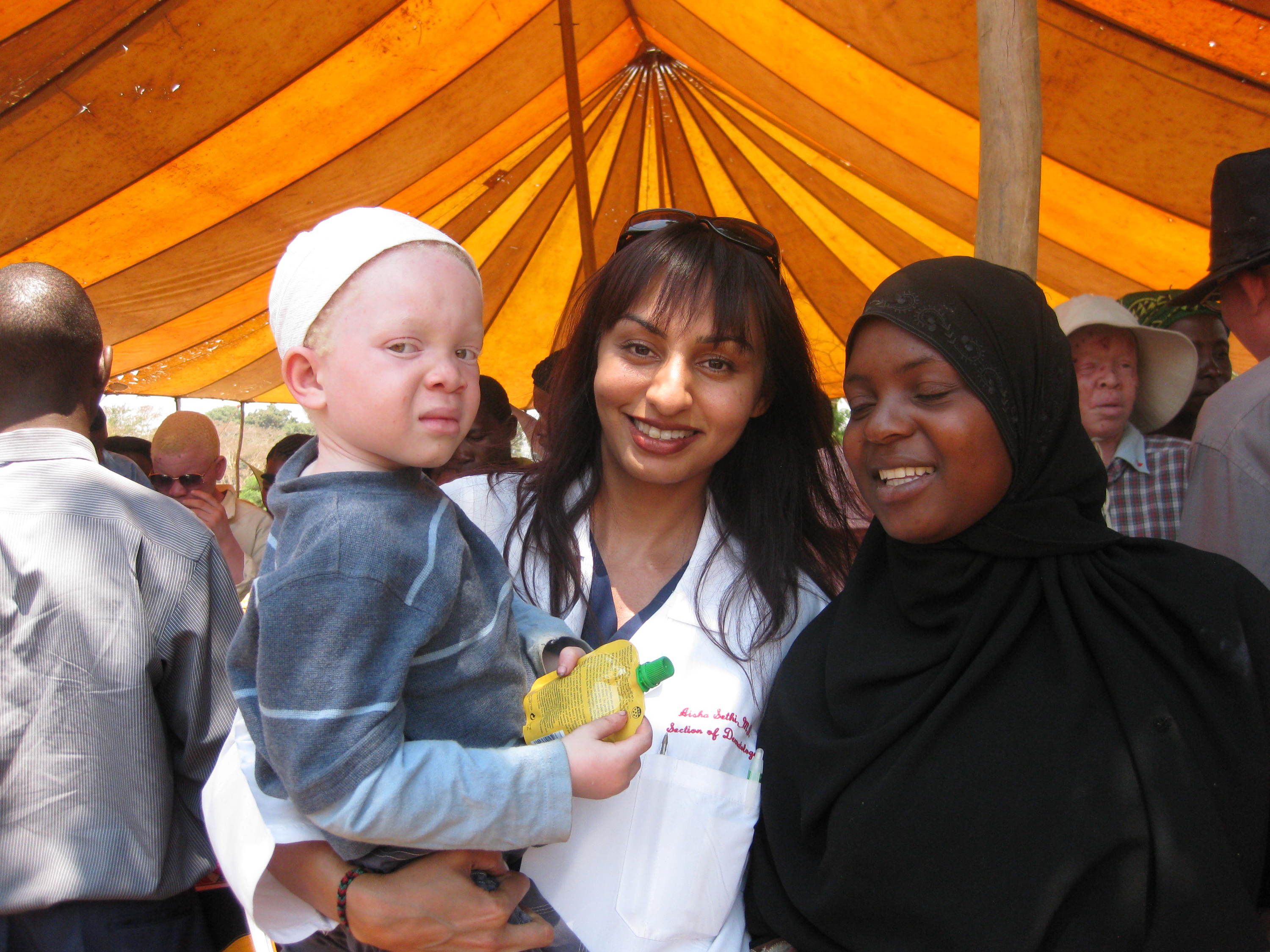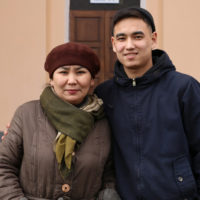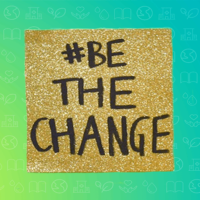When Aisha Sethi was young, she had one goal: to apply to university. Now Director of the Dermatology Global Health Program at Yale University’s School of Medicine, Aisha credits her experience at the Aga Khan University not only for a quality education, but for helping her forge a career in global health, with a focus on dermatology. Forget Botox and lasers: this practice is much more than skin deep.
Where did you grow up and what was your path to study at Aga Khan University?
Aisha Sethi: I was born in Charlotte, NC, where my parents were living at the time. Then our family returned to Pakistan and I grew up there, in Lahore.
When I was 16 years old, my one wish was to apply to university. I applied to AKU, was accepted, and went to study—at a time when I was engaged to be married. I thought that was going to be my life. There’s nothing wrong with being a homemaker but I had other aspirations. So when I got accepted into Aga Khan, getting into medical school was a dream come true. It truly changed the trajectory of my life.
How did you become interested in global health?
While I was a medical student at AKU in Karachi, Pakistan, I met AKU nursing students from Kenya in the hostel and we would chat about healthcare in their countries and AKU’s hospitals in Nairobi and Dar-es-Salaam. But my first inspiration was my AKU professor, Dr. Joseph McCormick, an infectious disease physician who had worked extensively on Ebola. It was his lectures on virology and his work in Africa that inspired me. He had written a book, Level 4: Virus Hunters of the CDC, as well. I became fascinated by infectious and tropical diseases. His book led me to the field of dermatology, as I learned that many of those illnesses present first on the skin. So dermatology was a natural entry point to global health for me.
Dermatology is more than just Botox and lasers. Here in America, infectious disease and dermatology are separate specialties; elsewhere, however, dermatology is at the forefront of approaches to infectious disease, especially in tropical medicine and global health.

In late 1998/early 1999, I traveled to Yale as a visiting medical student for two months of electives, and then received a NIH dermatology research fellowship from Yale. At Yale, I was thrown into an international, high-performance setting, arriving right after my AKU graduation. But AKU had prepared me well and I felt very blessed.
What inspired you then?
After completing AKU’s Bachelor of Medicine, Bachelor of Surgery program in 1999 and the Yale research fellowship, I was accepted into the Yale Dermatology Residency Program, one of the top training programs in the country. The faculty at Yale were very encouraging of my aspirations to pursue tropical medicine. As a dermatology resident, I took an elective month to work at the Hospital for Tropical Diseases (HTD) in London, which was affiliated with the London School of Hygiene and Tropical Medicine. In late 2005, for my final year of residency elective, I visited East Africa for the first time and saw Aga Khan University labs all over Kenya and Tanzania. I was proud of the widespread community healthcare being provided by AKU. During those months, I worked at a dermatology training center in Moshi, Tanzania.
It was such a valuable experience that when I started as a young faculty member at the University of Chicago, I arranged to take a group of medical students and residents with me for one month every year to Malawi. Malawi lacked dermatologists at the time; the country had dermatology officers who worked very hard to provide care to scores of patients each. This arrangement provided people in Malawi with medical services, education, and training—and at the same time, it showed U.S. medical students and residents how to practice efficiently in resource-restricted settings, while strengthening their clinical skills.
The Africa program was very satisfying. It makes me feel blessed and happy that so many students have decided to gain global health experiences, such as the elective in Malawi. They are touched by that experience consistently in a positive way and it impacts their career choices. For some, it is a life-changing experience in how they approach providing healthcare.
Please talk about your work with albinism in Africa.
One of my first efforts in international health was in Malawi, where I organized the first Albinism Awareness Day in 2007.
One of the most inspiring moments for me was in planning and promoting that event. I handed out flyers, while radio announcements helped spread the word, but I really wasn’t sure how many people would show up.
When the day came, it was amazing to see how many women had walked many miles with their babies from their villages to attend the event. It showed how deeply they cared and were motivated to seek treatment. The next year’s event was even bigger. It was incredible to see all these women and men lined up, bringing their babies to learn how to help them. It reminded me that the color of your skin doesn’t matter. Health can be an opportunity to bring people together.
What about more recent international health initiatives?
Later, I arranged for the first North American meeting on Tropical Dermatology in 2009, which had the effect of encouraging med students to get involved in the field. This was the first professional meeting in the country ever to focus on tropical skin diseases.
At the conference, one of the first speakers was Dr. McCormick, my professor from AKU, who was the dean of public health at University of Texas, Brownsville at the time (and now at University of Texas, Rio Grande Valley). I wanted him to know he was the one who inspired me.
I’ve also worked recently in providing care for refugees in Malawi, Pakistan, and Jordan, in the latter case with the Syrian American Medical Society (SAMS). Joining the work of the SAMS medical mission near Amman, I realized, “This is something that is super needed.”

Now you have returned to Yale?
Yes, I came back a year ago to get the global health program at Yale underway, and see how we can fit different pieces together. Here they’ve known me for 20 years, ever since I was a visiting medical student from AKU. It’s like coming home.
Back when I first came, my faculty members were not familiar with Aga Khan students. Now they know Aga Khan.
I owe AKU so much. The quality of training I received there put me at ease here, first as a medical student at Yale. Now I hope to inspire the next generation of young people. One of the major lessons that I learned from AKU is that you train the community, not the individual. AKU teaches you to respect your patients and their community, and pay attention to culture before intervening with any healthcare intervention, and that is key.
Dr. Aisha Sethi is Director of the Dermatology Global Health Program at Yale University’s School of Medicine. She graduated from Aga Khan University in 1999.
This post is part of the #humansoftheworld series on our blog—a collection of tales we can both relate to and marvel at. Here, we share stories of appreciation, self-reliance, and strength from across the Aga Khan Development Network.


